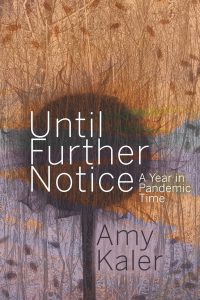Through the first year of the pandemic, hemmed in by COVID-19 advisories, winter weather in Edmonton and the need to keep herself and her loved ones safe, Amy Kaler experienced fears and anxieties common to many. As a professor of sociology at the University of Alberta, however, she was able to turn the vast tools of her discipline around and focus them on the pandemic. The resulting book is a fascinating navigation of the first year of COVID-19 from a view that blends the personal and the academic.
As she experiences isolation, deep fear, loneliness and anger, Kaler delves into these emotions from the standpoint of a researcher and professor, and also as a woman finding her way as best she can in a vastly reconfigured world. She explores the driving mechanisms behind the powerful emotional outbursts she witnesses in others and tries to hold at bay in herself, “people […] wearing their insides on their outsides, fear and nervousness and disinhibition glistening like viscera.”
As she looks for somewhere to explore and temper her own profound anxiety, Kaler finds herself turning to the more-than-human world all around her that she had never truly noticed before. In Edmonton’s North Saskatchewan River valley and in Mill Creek Ravine she begins to build a relationship with place, plants and animals that enriches her life precisely at a time when other human relationships have been denied. Scrambling down the deer trails and mountain-biking runs, she connects to her neighbourhood in a way she has never done before. Prior to COVID-19, Edmonton had been merely a place to live and work, and the mental map of her days was grounded entirely in the human; now, she finds herself learning more about the river valley right outside her door, full of life, full of medicine.
The inevitable catch of a work created during the early days of the pandemic about the pandemic is that it is built on constantly shifting ground, but Kaler is aware of this. She is honest throughout the book that though she is strongly rooted in her convictions, what she writes reflects only one position. While she is compassionate, she is also aware of her own privilege and how it underpins her views. She makes note too of the way in which the slip-slide of pandemic time is both constant and stymying, and that during a period of such rapid shifts in information, perhaps it is enough to live with as much rigorous intelligence and compassion as we can muster right now. Ultimately Kaler offers no trite advice or glib aphorisms. She offers thoughtful company along the path to a post-pandemic future than none of us can yet quite fathom.
Jenna Butler is the author of Revery: A Year of Bees (2020).


